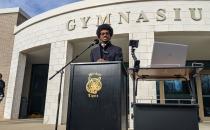Valero crude oil leak heightens concerns over proposed pipeline
Reports of an 800-gallon crude oil leak last year at a storage site near the terminus of a proposed high-pressure oil pipeline by Valero Energy Corp’s have heightened concerns about the risks the project poses to the Memphis Sand Aquifer, which supplies drinking water to the city.
Automated monitoring systems failed to detect the leak, caused by corrosion in 37-year-old pipes, at Valero’s Marshall County storage site in Mississippi. This is just couple counties away from Shelby County, Tennessee, where Memphis is located. Even though pipeline companies are now required to install leak detection systems, these do not always work as planned. In a study of 4,000 oil and fuel spills reported to the Pipeline and Hazardous Materials Safety Administration since 2010, only about seven percent were discovered because of leak detection systems.
Valero and Plains All American Pipeline have proposed building a high-pressure crude-oil pipeline through southwest Memphis, home to a number of Black neighborhoods, and directly through the wellfield that provides the local neighborhoods’ drinking water. Community groups have risen in opposition to the dangerous proposal.
“This latest leak just proves what we’ve been saying about this all along: There is no such thing as a safe oil pipeline,” said Justin J. Pearson, of Memphis Community Against the Pipeline. “Pipelines leak, almost inevitably. It’s not an abstract risk of harm, it’s something that will almost certainly happen if this project goes through.”
The Memphis Sand Aquifer supplies clean, reliable drinking water to Memphis and Shelby County— the largest metropolitan area in the United States that relies exclusively on groundwater for its municipal water supply.
The proposed Byhalia Pipeline would cross the Davis Wellfield, which Memphis Light, Gas & Water uses to supply drinking water to several Black communities and businesses in southwest Memphis. The high-pressure pipeline would also cross numerous Source Water Protection Areas in Northern Mississippi, including in areas where there is no protective clay barrier between the surface and the Memphis Sand Aquifer.
One of the communities in the proposed path of the pipeline is historic Boxtown, which got its name after formerly enslaved people built their homes there with scraps of materials and wood from train boxcars in the late 19th century.
For decades, Boxtown and other nearby communities have unfairly shouldered the pollution burdens of an oil refinery (owned by Valero), wastewater treatment facility, and both coal- and gas-fired power plants. A 2013 study found the cancer rate in the area is four times the national average. Asking residents to accept a pipeline that would threaten their drinking water is simply too much.
This community experiences the impacts of toxic industrial pollution every day. Most recently, during a severe cold weather event, Valero burned off gas in a hellish-looking flare that misted oil into Nonconnah Creek and released excess toxic gases in small amounts into the air.
SELC and a coalition of groups opposed to the pipeline have sent letters to Memphis Light, Gas and Water (MLGW) asking the utility to take active steps to protect the wellfields that communities rely on for safe, clean drinking water, including a hydrogeologic report warning of significant risks to the aquifer from the proposed pipeline and the hazardous toxins it could spill into the groundwater that feeds it.
“We really need local government to step up here,” said Ward Archer, president of Protect Our Aquifer. “The federal government has already approved one permit for this. Our drinking water has fallen into a regulatory gap where neither the state of Tennessee nor the federal government permits considered the risks to our aquifer. We need city officials to step up and safeguard our drinking water.”
County Mayor Lee Harris and State Senator Raumesh Akbari have recently joined the growing list of local politicians opposed to the Byhalia Pipeline, which also includes State Representative Barbara Cooper, City Councilmembers Jeff Warren and Edmund Ford, Sr., and Congressman Steve Cohen.

